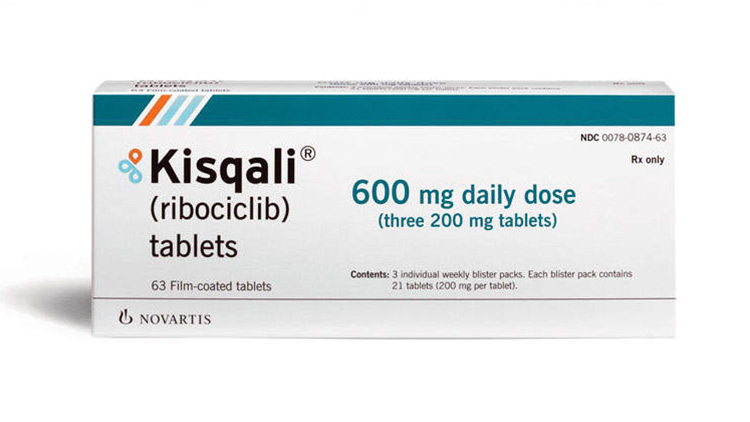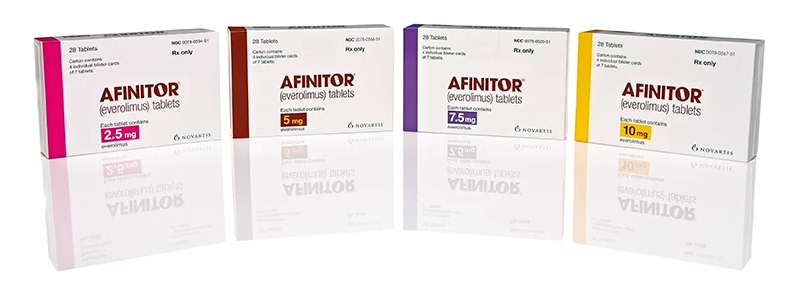Kisqali (ribociclib) vs Afinitor (everolimus)
Kisqali (ribociclib) vs Afinitor (everolimus)
Kisqali (ribociclib) and Afinitor (everolimus) are both used in the treatment of certain types of cancer, but they work in different ways and are approved for different indications. Kisqali is primarily used in combination with an aromatase inhibitor for the treatment of hormone receptor-positive, human epidermal growth factor receptor 2-negative (HR+/HER2-) advanced or metastatic breast cancer in postmenopausal women, whereas Afinitor is used for various cancers, including advanced hormone receptor-positive, HER2-negative breast cancer in postmenopausal women, but also for renal cell carcinoma and neuroendocrine tumors. The choice between Kisqali and Afinitor will depend on the specific type and stage of cancer, previous treatments, patient's health status, and potential side effects, and should be made in consultation with an oncologist.
Difference between Kisqali and Afinitor
| Metric | Kisqali (ribociclib) | Afinitor (everolimus) |
|---|---|---|
| Generic name | Ribociclib | Everolimus |
| Indications | HR-positive, HER2-negative advanced or metastatic breast cancer | Advanced hormone receptor-positive, HER2-negative breast cancer, advanced neuroendocrine tumors, renal cell carcinoma, tuberous sclerosis complex-associated seizures, subependymal giant cell astrocytoma (SEGA), renal angiomyolipoma |
| Mechanism of action | Cyclin-dependent kinase 4/6 (CDK4/6) inhibitor | mTOR inhibitor |
| Brand names | Kisqali | Afinitor, Afinitor Disperz, Zortress |
| Administrative route | Oral | Oral |
| Side effects | Neutropenia, nausea, infections, fatigue, diarrhea, leukopenia, vomiting, alopecia, headache, cough | Mouth ulcers, infections, rash, fatigue, diarrhea, edema, abdominal pain, nausea, fever, pneumonitis |
| Contraindications | Hypersensitivity to ribociclib, QT prolongation, liver impairment | Hypersensitivity to everolimus or other rapamycin derivatives, immunosuppression, infections, lung or breathing problems, liver impairment |
| Drug class | Antineoplastic agent, kinase inhibitor | Antineoplastic agent, mTOR kinase inhibitor |
| Manufacturer | Novartis Pharmaceuticals Corporation | Novartis Pharmaceuticals Corporation |
Efficacy
Efficacy of Kisqali (Ribociclib) in Breast Cancer Treatment
Ribociclib, marketed under the brand name Kisqali, is a targeted therapy used in the treatment of certain types of breast cancer. Specifically, it is approved for use in combination with an aromatase inhibitor for the treatment of pre/perimenopausal or postmenopausal women with hormone receptor-positive, human epidermal growth factor receptor 2-negative (HR+/HER2-) advanced or metastatic breast cancer, as initial endocrine-based therapy. In postmenopausal women, it is also approved for use in combination with fulvestrant for the treatment of HR+/HER2- advanced or metastatic breast cancer as initial endocrine-based therapy or following disease progression on endocrine therapy.
The efficacy of Kisqali has been demonstrated in multiple clinical trials. One such pivotal trial is the MONALEESA-2 study, which showed that when used in combination with letrozole, Kisqali significantly improved progression-free survival (PFS) compared to letrozole alone in postmenopausal women with HR+/HER2- advanced breast cancer. The trial results indicated a marked improvement in PFS, with the median not reached in the Kisqali plus letrozole arm at the time of the interim analysis, compared to 14.7 months in the placebo plus letrozole arm.
Efficacy of Afinitor (Everolimus) in Breast Cancer Treatment
Afinitor (everolimus) is another medication used in the treatment of HR+/HER2- advanced breast cancer. It is specifically indicated for postmenopausal women with advanced hormone receptor-positive, HER2-negative breast cancer in combination with exemestane, after failure of treatment with letrozole or anastrozole. Everolimus works by inhibiting the mammalian target of rapamycin (mTOR), a protein that plays a crucial role in the growth and proliferation of cancer cells.
The efficacy of Afinitor was established in the BOLERO-2 clinical trial, where it demonstrated a significant improvement in PFS when combined with exemestane, compared to exemestane alone in patients with HR+/HER2- advanced breast cancer who had recurred or progressed on letrozole or anastrozole. The combination of everolimus and exemestane increased the median PFS to 7.8 months, compared to 3.2 months for patients receiving exemestane alone. This represented a 57% reduction in the risk of cancer progression.
Regulatory Agency Approvals
Kisqali
-
European Medical Agency (EMA), European Union

-
Food and Drug Administration (FDA), USA

-
Health Canada

-
Therapeutic Goods Administration (TGA), Australia

-
Medsafe (NZ)

Afinitor
-
European Medical Agency (EMA), European Union

-
Food and Drug Administration (FDA), USA

-
Health Canada

-
Pharmaceuticals and Medical Devices Agency (PMDA), Japan

-
Therapeutic Goods Administration (TGA), Australia

Access Kisqali or Afinitor today
If Kisqali or Afinitor are not approved or available in your country (e.g. due to supply issues), you can access them via Everyone.org.
How it works

Make an enquiry
Choose the medicine you want to buy, answer a couple of questions, and upload your prescription to speed things up. We’ll get back to you within 24 hours.


Make an enquiry
Choose the medicine you want to buy, answer a couple of questions, and upload your prescription to speed things up. We’ll get back to you within 24 hours.


Breeze through the paperwork
We'll guide you through the required documents for importing unapproved medicine, ensuring you have all the necessary information.


Get a personalized quote
We’ll prepare a quote for you, including medicine costs and any shipping, administrative, or import fees that may apply.


Receive your medicine
Accept the quote and we’ll handle the rest - sourcing and safely delivering your medicine.

Some text on this page has been automatically generated. Speak to your physician before you start a new treatment or medication.
Let's talk
If you have any questions, call us or send us a message through WhatsApp or email:
Contact us




